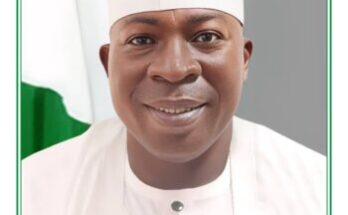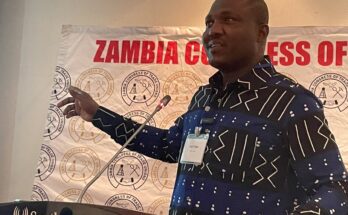Professor Ladi Sandra Adamu of Ahmadu Bello University (ABU), Zaria, is the first professor of Broadcasting in northern Nigeria as well as the only female professor in the field. In this interview with ABDULRAHMAN ZAKARIYAU she speaks on broadcasting in Nigeria, challenges in the industry and that of female lecturers in Nigeria universities.
What was growing up like for you and did it influence your career choice?
I was born to a military father in Lagos, Pankshin Adamu, of the Nigerian Army Corps of Engineers. My mother, Hassana Adamu, was a Home economist and was a catering staff of the Nigerian Defence Academy (NDA), Kaduna, until her retirement.
I grew up in Lagos, Yaba to be precise. I am from Plateau state in the old Pankshin local government area.
I started part of my education in the Army Children school, then before he was transferred to Kaduna. I had a good upbringing, during my time attending nursery was something else, but I went through nursery. And that prepared me; I spent just five years in primary school because when I came from Lagos to where we were in Kaduna, they said I was too intelligent for that class. So, they promoted me to the next class.
Also, my father tutored me at home, sometimes he gets people to come and teach me at home too. So, that was why I had sound education background. He wanted me to excel, particularly educationally.
I went to Queen Amina’s College, Kaduna, and for my tertiary education, I attended College of Journalism, Fleet Street, London (now City University London).
From the United Kingdom, I went to United States of America. I studied at Columbia College Hollywood, California and Loyola Marymount University, Los Angeles, also in California.
I finished my Master’s degree at 23 years and went to the UK College of Journalism, now a university. I majored in screenwriting. You see, it was either you do Production that is for television and film or you do animation or screenwriting. So, I didn’t choose, my head of department chose that for me because he felt I was creative and I would be a better screenwriter. But we did all the production courses.
Then I came back to Nigeria, to NTA Jos, where I was News Editor. From there I moved to the Democrat newspapers, I was the Weekly Editor; then I moved to the Catholic school, where I was director of training and then to the Ahmadu Bello University (ABU), Zaria, as a lecturer.
I started the broadcasting section in ABU in 1998/1999 second semester. I have been teaching broadcast courses basically and I also teach news and commentary.
I also teach online journalism and some production courses. I was in charge of Campus FM for 10 years; I started it with the BBC. So I rose through the ranks and became a professor.
I am the first professor of broadcasting from northern Nigeria including the FCT, and the only female. It was after my promotion to the Full Chair of Professorship that it became evident that I was the first in that area of specialisation in the region.
Why did you choose broadcasting?
For me, I fell in love with broadcasting even before I went to school in the UK. I was with NTA Jos, then Benue Plateau Television. I was an announcer and I was in the program section for about two years before I left for UK.
So, the passion was there and even my uncle wanted me to be in broadcasting, I don’t know why. He encouraged me because I had wanted to study nursing and he looked at me and said you are not cut out to become a nurse. Why not read journalism? So, he encouraged me and even in journalism I’m a broadcaster.
How would you assess the broadcast industry in Nigeria?
Broadcasting came to Africa through Nigeria, NTA, Ibadan, on October 31, 1959. So, Nigeria is a pace setter when it comes to broadcasting. We were the first to start satellite, we were also the first to go colour. It started in NTA Jos in 1975.
So, you cannot talk about broadcasting in Africa and not talk of Nigeria. Nigeria is the home of media content for Africa. Look at Nollywood, it started in Jos. But because of the riots it scattered and we don’t have a studio system like Hollywood.
We need a studio system where people just go there and produce their work. Here we don’t have that. I went to Bollywood, it’s organized, and they have a studio system. That is what we should be looking out for, how we can have our studio system.
Jos is peaceful now they can go back there. The reason they chose Jos was because of the beauty and the cool weather. You know production equipment work well in cool environment.
So, Nigeria is not doing badly in broadcasting, in fact we are a force to reckon with in the world. When I went to South Africa to present a paper on Nigeria communication policies, I mentioned some of these things I am talking about and the white men were surprised. They thought Mnet was number one in Africa, I said no Mnet is not number 1 in Africa, Nigeria is number 1.
Then I went on to give them the scenario of how we started ahead of Egypt. Egypt is considered home of civilization, but this time around Nigeria beat them to it. Broadcasting started in Nigeria. So we are doing very well in broadcasting.
How do you think Nigeria can improve the industry?
You know we have regional variation, Kannywood, Yoryhood, Igbohood, may be Jollyhood Jos, but Nigeria is number three, globally in terms of ranking, production and shunning out new movies every week. The global players are United States of America, India, and Nigeria. Hollywood, Nollywood, Bollywood.
So, the best thing is peace. If there is peace around Nigeria there is need to create more studio system, we can have one in Asaba. Some of these Nollywood films are produced in Asaba hotels, because there is no studio. That is why in the films are usually dry if it’s a normal house, how can you have bedroom without clothes scattered around the room, without chair, the production looks so dry because they are hotels and not studio.
If we have a studio system, you will go there rent space and make use of it. In the studio system everything will look real. So, once we get that studio system we will get there. And it’s the government that will do it; the industry has not reached the stage where private individuals can build a studio system like in US. So, government needs to do something about it. We can have it in Kano, Jos, Port Harcourt, Asaba, and Lagos.
What plans do broadcasting professors in Nigeria have for the industry?
I am sure you have heard of African Council for Communication Education (ACCE) and about when we went to Pan Atlantic University that was last year for our national convention.
Our National President suggested that members should be grouped according to areas of specialization. So, right there at that meeting, we were grouped. And we in the broadcasting are working on something that will be of benefit to the industry.
Do you face challenges as a female lecturer?
I have taught about 20 undergraduate courses and 10 postgraduate courses since my employment in Ahmadu Bello University 21 years ago. So, I can tell you that yes there are few challenges for female lecturers in most Nigerian universities. There are challenges of ethnicity, of religion and religion.
You are being denied certain positions because of gender and where you come from. But you see that doesn’t border me. I was busy developing myself, I used to stay late in the office writing journals and doing some consultancy academic work. Look at where I have reached. You know when I was studying my Ph.D. I never knew that one day I will break record to be the first female broadcasting Professor in the North, even in Nigeria there are questions.
The main challenge is that some people feel that a woman cannot be their boss in this 21 century. After we all agreed at Beijing that women should be given the same opportunity as men so that they can contribute their quota to the development of the society but it appears some of these gender inequality issues will take time before it will be eradicated in Nigeria.
There is need to sensitized the men. Before now, how many female lecturers did we have in a department? If you counted you would have found, may be, only three but now we have up to 7 in some departments. So, there are not enough women. It will take time to get there.
Though we have problem with girl-child education in the North, I am an advocate of girl child education. Initially when I was growing up, my grandmother used to query my father for spending so much money on a girl that would end up in another man’s house. It took the grace of God and intervention of some family friends for her to accept that I had right to education like the male children in the family.
So, I like to encourage women to go to school, no matter where they are from. When women go to school, it enables them help and support their families. Women are more caring than men. So, I believe there should be special scholarship scheme for women to go to university. There should be free education for girls.
How do you manage family affairs and work?
It’s about organizing, when you plan well everything will fall in line. When I wake up in the morning I do what I am supposed to do after prayers. Then I have my breakfast.
You know in most lecturers’ houses there is a study; I make sure I stay in my study for one or two hours before I go to work. So most times I work from home and the office. And then come back home.
Which of your accomplishments give you joy?
Seeing my students excel. When I tune to Good Morning Nigeria on NTA and I see Salamatu, I feel happy. When I see Onye, with CNBC I feel happy. When I buy paper I read Amina Alhassan, Deputy Editor, Weekend Trust.
My joy is that I have my students doing well in almost all sectors of the country. So, it gives me joy that my students are contributing to the development of Nigeria. When I retire, that should be my joy.
What is your advice to the girl child?
First of all, you can’t be like me without going to school. You may not have the privilege to go to the kind of schools I went to, but you can still go to a normal school. But no matter your religion, tribe, and background go to school.
Be hard working, know how to live with people of all tribes and religions. Be your sisters’ keeper; support your sisters in politics.



